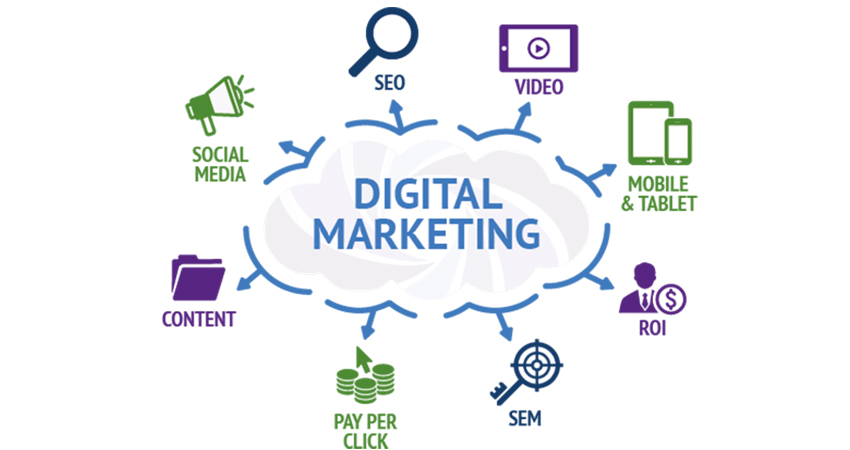
In today’s digital landscape, businesses must embrace digital marketing to remain competitive. A well-structured strategy enables businesses to reach their target audience, build brand awareness, and drive sales. With an ever-evolving online ecosystem, companies need to develop a comprehensive digital marketing strategy to maximize their potential.
Building a Comprehensive Digital Marketing Strategy
A successful digital marketing strategy integrates multiple channels and techniques tailored to a business’s specific needs. Key components include paid advertising, social media marketing, search engine optimization (SEO), content marketing, and email marketing.
1. Paid Advertising: Quick and Targeted Outreach
Paid advertising is an effective way to reach a broad audience quickly. Platforms like Google Ads and social media networks allow businesses to target specific demographics, interests, and search keywords. By leveraging pay-per-click (PPC) advertising, businesses can drive instant traffic and conversions.
2. Social Media Marketing: Building Relationships and Brand Loyalty
Social media platforms such as Facebook, Instagram, LinkedIn, and Twitter provide an opportunity for businesses to engage with their audience, share valuable content, and foster community growth. Businesses can enhance engagement through interactive posts, contests, live sessions, and customer interactions.
3. Search Engine Optimization (SEO): Boosting Online Visibility
SEO involves optimizing a website to rank higher in search engine results pages (SERPs). By improving website speed, incorporating relevant keywords, and enhancing content quality, businesses can attract more organic traffic and gain better visibility.
4. Content Marketing: Providing Value and Building Trust
Content marketing focuses on creating and distributing valuable, relevant, and consistent content to attract and retain a specific audience. High-quality blog posts, informative articles, engaging videos, and compelling infographics help businesses establish themselves as industry leaders while nurturing customer trust.
5. Email Marketing: Personalized Communication for Customer Retention
Email marketing remains one of the most effective ways to maintain customer relationships. Businesses can use email campaigns for newsletters, product promotions, and customer engagement. Segmenting audiences based on preferences and behaviors ensures a more personalized experience.
Why Digital Marketing is Essential for Businesses

Digital marketing is not just an option—it is a necessity. Companies that embrace a strong online presence can significantly increase lead generation and sales conversion rates. According to marketing studies, businesses with an optimized digital strategy are 50% more likely to generate leads and 35% more likely to close deals than those without one.
Types of Digital Marketing Strategies
Different digital marketing strategies cater to different business needs. Some of the most effective ones include:
- SEO: Enhancing website visibility through optimization techniques.
- Social Media Marketing: Leveraging platforms to build an online presence.
- Email Marketing: Sending targeted messages to maintain customer relationships.
- Content Marketing: Creating valuable content to engage and inform audiences.
- PPC Advertising: Investing in paid ads to drive immediate traffic and conversions.
Steps to Developing an Effective Digital Marketing Strategy
- Define Your Goals: Identify key objectives, such as increasing website traffic, generating leads, or improving sales.
- Know Your Audience: Understand their demographics, interests, and online behavior.
- Select the Right Channels: Choose the most effective platforms to reach your audience.
- Create High-Quality Content: Develop engaging and informative content tailored to audience needs.
- Analyze and Optimize: Continuously monitor campaign performance and refine strategies based on analytics.
Navigating the Digital Marketing Landscape

In today’s fast-paced business environment, a well-crafted digital marketing strategy helps businesses stand out. Below are key areas to focus on for success:
1. Paid Advertising: Reaching the Right Audience Efficiently
Platforms like Google Ads, Facebook Ads, and LinkedIn Ads enable businesses to run targeted campaigns. These ads can be customized based on audience behavior, ensuring higher conversion rates.
2. Email Marketing: Strengthening Customer Connections
Email marketing is an affordable way to nurture relationships and promote new products. Regular newsletters keep customers engaged, while automated workflows streamline marketing efforts.
3. Content Marketing: Educating and Engaging Customers
High-value content—such as blogs, how-to guides, and video tutorials—positions businesses as authorities in their industry. This strategy enhances customer trust and encourages repeat engagement.
4. Social Media: A Powerful Engagement Tool
Social media platforms bridge the gap between businesses and consumers. Engaging posts, influencer partnerships, and customer interactions contribute to brand visibility and loyalty.
5. SEO: The Key to Long-Term Online Presence
Optimizing a website ensures a steady flow of organic traffic. Businesses should focus on keyword research, mobile optimization, and backlink-building to maintain a competitive edge.
Tracking and Measuring Success
Regularly evaluating digital marketing efforts is crucial. Businesses should track:
- Website Traffic: Identify sources driving the most visitors.
- Conversion Rates: Measure lead-to-customer conversion effectiveness.
- Social Media Engagement: Analyze likes, shares, and comments.
- Email Open Rates: Evaluate the effectiveness of email campaigns.
By leveraging data-driven insights, businesses can refine their strategies and maximize ROI.
Embracing Innovation and Adaptability
The digital marketing landscape is constantly evolving. Staying updated with emerging trends, such as AI-driven marketing, voice search optimization, and interactive content, helps businesses maintain a competitive advantage. Adaptability and innovation are key to long-term success.
Conclusion
Digital marketing is a game-changer for modern businesses. By developing a strategic approach, leveraging the right tools, and continuously optimizing efforts, businesses can unlock new growth opportunities. A well-executed digital marketing strategy not only enhances brand awareness but also drives customer engagement and long-term profitability. Embracing digital transformation is no longer optional—it is essential for sustained business success in the digital age.
